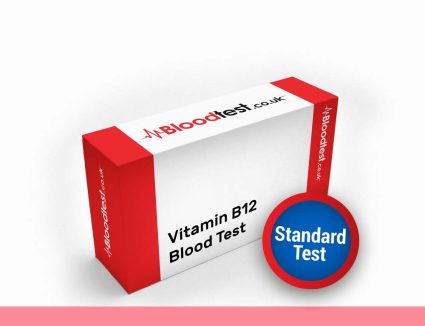In-Depth Analysis of Vitamin B12 Deficiency: Uncovering Its Health Impacts
Essential Information on Vitamin B12 for Optimal Health and Wellbeing

Vitamin B12 Blood Test in Ilkeston: Vitamin B12, scientifically known as cobalamin, is a crucial water-soluble vitamin that plays a pivotal role in maintaining optimal human health. This essential nutrient is vital for the proper functioning of the brain and nervous system, and it is indispensable for the production of red blood cells. A lack of this critical vitamin can result in severe health complications, such as anaemia and various neurological disorders. In the United Kingdom, dietary sources of Vitamin B12 are predominantly animal-based, including meat, fish, milk, and eggs, making it essential for individuals to consume these foods to maintain adequate levels. Particularly in regions like Ilkeston, where dietary habits may vary, understanding the importance of Vitamin B12 for public health is of the utmost significance.
Since the human body cannot synthesise Vitamin B12 independently, it must be obtained through diet or supplements. Individuals who do not consume sufficient amounts of animal-derived food products, such as vegans and vegetarians, should be particularly attentive to their Vitamin B12 levels. Although the body can store substantial quantities of Vitamin B12 in the liver, these reserves can diminish over time, underscoring the importance of regular testing as a preventive measure. A comprehensive understanding of Vitamin B12's role is essential for recognising deficiency symptoms and pursuing appropriate testing methods, such as the Vitamin B12 blood test in Ilkeston.
Interested in Audio Insights Regarding Vitamin B12?
 Recognising the Primary Symptoms of Vitamin B12 Deficiency
Recognising the Primary Symptoms of Vitamin B12 Deficiency
The symptoms associated with Vitamin B12 deficiency can often manifest subtly in the early stages, frequently being confused with general fatigue or stress. Common indicators of this deficiency include persistent fatigue, debilitating weakness, and a pervasive sense of malaise. Some individuals may also experience constipation, a reduced appetite, and unintentional weight loss, all of which can significantly disrupt daily activities and overall wellbeing. Additionally, neurological symptoms may surface, manifesting as tingling or numbness in the extremities, cognitive impairments, or mood fluctuations, including bouts of depression and heightened irritability.
These symptoms go beyond mere inconveniences; they can profoundly impact an individual's quality of life, particularly in a tightly-knit community such as Ilkeston, where social interactions are essential for mental health. If left unaddressed, a deficiency can escalate into more severe complications, including irreversible neurological damage or significant cognitive decline. It is imperative for individuals experiencing these symptoms, especially those belonging to high-risk groups, to consider testing options like the vitamin B12 blood test in Ilkeston to identify potential deficiencies early.
Identifying Vulnerable Groups at Risk for Vitamin B12 Deficiency
Specific demographics show a heightened susceptibility to Vitamin B12 deficiency. Older adults often exhibit a reduced ability to absorb Vitamin B12 due to changes in gastric function. Furthermore, those following vegan or vegetarian diets may find it challenging to obtain adequate B12 from food sources, as it is predominantly derived from animal products. Individuals suffering from gastrointestinal disorders, including Crohn's disease or coeliac disease, may also encounter absorption difficulties, which increases their risk of deficiencies.
In Ilkeston, where a diverse population exists, it is crucial to raise awareness about these risk factors. Healthcare professionals should proactively recommend testing for these vulnerable groups, particularly those over the age of 60, as well as pregnant or breastfeeding women who require additional B12 for their child's development. Community health initiatives can be significantly enhanced by understanding who is at risk and advocating for regular screening, such as the vitamin B12 blood test in Ilkeston, to ensure optimal health.
Gaining Insights into the Diagnostic Process for Vitamin B12 Deficiency

Diagnosing Vitamin B12 deficiency typically requires a blood test to accurately assess Vitamin B12 levels. The standard test provides initial readings; however, further testing may be necessary to confirm the deficiency if the results indicate low levels. A commonly used follow-up test is the methylmalonic acid (MMA) test, which helps determine whether the deficiency is due to inadequate intake or absorption challenges.
Local healthcare facilities in Ilkeston are equipped to perform these essential tests. It is vital for individuals to recognise that early diagnosis can lead to more effective treatment strategies. Regular monitoring can also assist in detecting deficiencies that may develop gradually, particularly in high-risk populations. Those exhibiting symptoms or who have known risk factors should engage in conversations with their healthcare providers regarding the vitamin B12 blood test in Ilkeston as a proactive health measure.
Effective Strategies for Treating and Preventing Vitamin B12 Deficiency
The treatment for Vitamin B12 deficiency generally involves supplementation, which may be administered in the form of oral tablets or intramuscular injections, depending on the severity of the deficiency and the individual's ability to absorb B12. It is vital to educate individuals with dietary restrictions on how to incorporate B12-rich foods into their meals, such as fortified cereals and a wide variety of dairy products.
Preventative measures are equally important. Routine health check-ups and monitoring for at-risk individuals can significantly aid in maintaining adequate B12 levels. Community awareness campaigns in Ilkeston that focus on dietary sources of Vitamin B12 and the importance of testing can dramatically reduce the incidence of deficiency. By implementing consistent screening and treatment strategies, the community can collectively enhance overall health outcomes related to Vitamin B12 deficiency.
The Vital Importance of Vitamin B12 Testing in Health Management
Recognising the Importance of Vitamin B12 Testing

Testing for Vitamin B12 is a crucial step in the timely identification of deficiencies, enabling prompt interventions. The consequences of undiagnosed deficiency can be severe, potentially resulting in neurological damage, cognitive decline, and anaemia. In Ilkeston, where community health is interconnected, ensuring that residents receive adequate testing can significantly enhance overall wellbeing while alleviating the long-term healthcare burden associated with Vitamin B12 deficiency.
The test becomes particularly essential for individuals who display symptoms of fatigue, weakness, or neurological disturbances. Early diagnosis not only increases the chances of effective treatment but also prevents the escalation of health complications that may arise from prolonged deficiencies. Regular testing empowers individuals to participate in proactive health management, ensuring they maintain optimal Vitamin B12 levels throughout their lives.
When to Consider Scheduling Your Vitamin B12 Test
Individuals should consider undergoing testing for Vitamin B12 levels if they exhibit symptoms indicative of deficiency or belong to high-risk groups. Symptoms such as chronic fatigue, memory issues, or sensory disturbances necessitate immediate testing. Furthermore, individuals with dietary restrictions, including vegans or vegetarians, should consistently monitor their Vitamin B12 levels due to their limited intake from food sources.
In Ilkeston, general practitioners and local health clinics are well-equipped to provide guidance on when to schedule these essential tests. Recommendations typically advocate for testing during routine health check-ups, especially for older adults, pregnant women, or those with gastrointestinal issues, thereby offering peace of mind and a proactive approach to health management.
The Benefits of Early Detection of Vitamin B12 Deficiency
Identifying Vitamin B12 deficiency at an early stage can significantly improve an individual's quality of life. Timely intervention can avert severe health complications, such as irreversible neurological damage and chronic anaemia. Moreover, early identification allows for the creation of personalised treatment plans that can enhance energy levels, cognitive abilities, and overall wellbeing.
In a community like Ilkeston, the advantages of early detection extend beyond individual improvements, contributing to enhanced public health outcomes. By promoting regular testing and increasing awareness about the significance of Vitamin B12, the community can assist individuals in maintaining their health, ensuring deficiencies are addressed before evolving into more significant health challenges.
Steps to Arrange Your Vitamin B12 Test in Ilkeston
How to Easily Schedule Your Vitamin B12 Test
Arranging your Vitamin B12 test in Ilkeston is a straightforward and accessible process. Local clinics and healthcare providers offer various options for setting up appointments. You can either contact your GP directly or utilise online health platforms that allow for easy booking. This flexibility enables individuals to choose a time that accommodates their busy schedules, ultimately promoting proactive health management.
It is advisable to select clinics with a strong reputation for patient care and expertise in conducting Vitamin B12 testing. Many healthcare facilities in Ilkeston offer resources to educate patients on the importance of testing and what to expect during the process. By ensuring readily accessible bookings, communities can motivate more individuals to take charge of their health.
Essential Preparations for Your Vitamin B12 Test
Preparing for a Vitamin B12 blood test typically involves minimal requirements, but may include specific instructions from your healthcare provider. Adhering to any guidelines given is vital, as some tests may require fasting or timing considerations related to medications. Being adequately prepared can help ensure accurate results and facilitate a smoother testing experience.
Patients in Ilkeston should feel comfortable discussing any concerns or questions with their healthcare providers regarding test preparation. Understanding what to expect can alleviate anxiety and help individuals approach the testing process with confidence.
What to Expect During the Vitamin B12 Test Procedure
The Vitamin B12 blood test is a straightforward procedure that involves blood collection, typically from a vein in your arm. This process is usually quick and conducted by a trained professional who prioritises your comfort. Fear of needles is common, but being informed about the procedure can help mitigate concerns.
Once the blood sample is taken, there may be a brief waiting period while the sample is processed. Patients can expect to receive results within a few days, either via email or through their healthcare provider's portal. This quick turnaround is crucial for those eager to understand their Vitamin B12 levels and any potential subsequent treatment steps.
Interpreting Your Test Results: Understanding What They Mean
Receiving your Vitamin B12 test results marks a significant milestone in managing your health. Typically, results are communicated within a few days, facilitating timely discussions concerning your Vitamin B12 status. Your healthcare provider may recommend further testing, dietary modifications, or immediate supplementation based on the findings.
Patients must understand how to interpret these results. Normal ranges will be provided for comparison, and anyone with results indicating low levels should consult their healthcare provider regarding the next steps. In Ilkeston, local health services guide patients through their results, ensuring that everyone receives the necessary support to maintain optimal health.
Understanding Your Vitamin B12 Test Results
Effectively Interpreting Your Test Results
Interpreting your Vitamin B12 test results involves analysing the reported levels and comparing them to standard reference ranges. Typically, normal Vitamin B12 levels range from 190 to 950 picograms per millilitre. Levels falling below this threshold may signal a deficiency, making it essential to discuss these results with a healthcare professional who can provide insights tailored to your health circumstances.
In Ilkeston, healthcare providers are well-equipped to assist patients in comprehending their results. When evaluating the significance of the results, they will take into account clinical symptoms, dietary habits, and overall health. This comprehensive approach ensures that necessary treatment plans are formulated based on a thorough understanding of the patient’s health.
Understanding the Implications of Low Vitamin B12 Levels
Low Vitamin B12 levels indicate a deficiency that may require further investigation. This deficiency could stem from inadequate dietary intake, absorption challenges, or underlying health conditions affecting Vitamin B12 metabolism. Identifying the root cause of low levels is critical for determining the appropriate action, which may involve dietary modifications, supplements, or injections.
Patients in Ilkeston should remain calm if they receive low results; numerous treatment options exist to address deficiencies. Engaging in a conversation with healthcare providers can clarify the next steps, which may include follow-up tests to explore the underlying causes of the deficiency.
Next Steps Following Receipt of Your Vitamin B12 Test Results
Upon receiving your Vitamin B12 test results, it is vital to discuss them with your healthcare provider. They will assist you in understanding the implications of your results and develop a tailored plan to address any deficiencies. This plan may encompass dietary modifications, supplements, or ongoing monitoring to maintain optimal levels.
In Ilkeston, local health services can guide individuals through their treatment options and support them in making lifestyle adjustments. Regular follow-ups may be necessary to ensure that Vitamin B12 levels remain stable over time, ultimately contributing to improved overall quality of life.
Factors Affecting Vitamin B12 Levels: Key Insights
Numerous factors can influence Vitamin B12 levels, including diet, age, medications, and underlying health conditions. For instance, individuals adhering to a strict plant-based diet may struggle to obtain sufficient B12 from food alone. Certain medications, particularly those that affect stomach acid production, can hinder Vitamin B12 absorption, leading to deficiencies.
In Ilkeston, healthcare professionals should take these factors into account when interpreting test results. A comprehensive evaluation of a patient’s lifestyle and health history is essential for understanding their situation. This information will guide decisions regarding dietary supplements, lifestyle modifications, and ongoing monitoring of Vitamin B12 levels.
Strategies for Monitoring and Sustaining Healthy Vitamin B12 Levels
Regular monitoring of Vitamin B12 levels is crucial for individuals at risk of deficiency, especially in communities like Ilkeston. Once a treatment strategy is established, follow-up testing will help ensure that B12 levels remain within the optimal range. Patients should collaborate closely with healthcare providers to determine the frequency of testing based on individual risk factors and health conditions.
Maintaining healthy Vitamin B12 levels may also require dietary changes, ensuring consistent intake of Vitamin B12 through food or supplements as necessary. Lifestyle modifications, such as reducing alcohol consumption and managing stress levels, can enhance Vitamin B12 absorption, contributing to overall vitality and wellness.
Exploring Effective Treatment Options for Vitamin B12 Deficiency
Incorporating Nutrient-Dense Foods into Your Diet
Integrating B12-rich foods into your diet represents a primary strategy for addressing Vitamin B12 deficiency. Foods such as meat, fish, dairy products, eggs, and fortified cereals are excellent sources. For those in Ilkeston who may face dietary restrictions, exploring fortified plant-based alternatives is crucial.
Educating individuals about the importance of including these foods in their diets empowers them to take control of their health. For example, local workshops and community programmes can assist with meal planning, highlighting Vitamin B12 sources and ensuring that residents are well-informed about their nutritional needs.
Utilising Supplements and Injections for Optimal Health
Healthcare providers may recommend oral supplements or injections for individuals diagnosed with Vitamin B12 deficiency. The choice between these treatment options generally depends on the severity of the deficiency and the individual’s ability to absorb B12 through the digestive system. Injections are typically reserved for those with significant deficiencies or absorption challenges.
Local clinics in Ilkeston can facilitate these treatments, ensuring that patients receive personalised care tailored to their specific health needs. Regular follow-up appointments will monitor progress and adjust treatment plans as necessary, providing a comprehensive approach to managing Vitamin B12 deficiency.
The Importance of Consistent Monitoring and Follow-Up Care
Routine follow-up tests are essential for individuals undergoing treatment for Vitamin B12 deficiency. These tests will help determine whether the treatment is effective and if Vitamin B12 levels are stabilising. Patients should work closely with their healthcare providers to establish a follow-up testing schedule that meets their needs.
Within the community of Ilkeston, healthcare professionals play a crucial role in managing and monitoring patients who have received treatment for deficient levels. Open communication between patients and providers ensures that everyone is informed and confident about their health journey.
Ensuring Regular Vitamin B12 Intake for Optimal Health
To maintain healthy Vitamin B12 levels, individuals should strive for consistent intake through food or supplements. Incorporating fortified foods into one's diet presents a practical solution for those at risk of deficiency. Educating oneself about the signs of deficiency is equally beneficial, ensuring that any potential issues are addressed promptly.
In Ilkeston, community initiatives can enhance awareness about the significance of Vitamin B12, encouraging residents to adopt healthier eating habits and pursue regular testing. By fostering a culture of health consciousness, the community can collaboratively work towards preventing deficiencies and promoting overall wellbeing.
Implementing Positive Lifestyle Changes
Making lifestyle modifications can significantly impact Vitamin B12 absorption and utilisation. Reducing alcohol intake is one such adjustment, as excessive consumption can hinder the absorption process. Furthermore, managing stress through relaxation techniques or physical activity can further support overall nutrient absorption.
Policymakers and healthcare providers can collaborate in a community like Ilkeston to create supportive environments that encourage healthy lifestyle choices. By promoting wellness initiatives and educational programmes, residents can learn how to implement changes that will benefit their Vitamin B12 levels and overall health.
Essential Local Resources for Vitamin B12 Support in Ilkeston
Connecting with Qualified Healthcare Professionals
Ilkeston boasts a variety of healthcare providers offering Vitamin B12 testing and treatment services. Local GPs and clinics can assist individuals in scheduling their tests, discussing results, and formulating treatment plans tailored to their unique health needs.
Residents must choose healthcare providers who possess a solid understanding of Vitamin B12 and its implications for health. Engaging with local providers can enhance community health outcomes, ensuring that individuals receive the necessary support to maintain optimal Vitamin B12 levels.
Joining Support Networks for Shared Experiences
Participating in local support groups focused on Vitamin B12 deficiency can greatly benefit individuals seeking advice and shared experiences. These groups provide a platform for education, emotional support, and connections with others facing similar health challenges.
In Ilkeston, community organisations can facilitate these support networks, offering resources and fostering an environment of understanding and empowerment. Sharing experiences can help individuals feel less isolated, motivating them to take proactive steps in their health journey.
Engaging in Educational Workshops to Enhance Awareness
Participating in workshops and seminars related to Vitamin B12 and overall health in Ilkeston can provide valuable insights and knowledge. These events typically cover topics such as dietary sources of Vitamin B12, the significance of testing, and strategies for prevention.
Local health organisations can play a vital role in organising these educational initiatives, ensuring that the community remains well-informed about the importance of Vitamin B12 in maintaining health. By fostering a culture of learning, residents can empower themselves and others to prioritise their health and wellbeing.
Frequently Asked Questions Regarding Vitamin B12
What does a Vitamin B12 blood test entail?
A Vitamin B12 blood test measures the level of Vitamin B12 in the bloodstream. This test is essential for diagnosing deficiencies and evaluating overall nutritional health.
How can I arrange a Vitamin B12 test in Ilkeston?
You can schedule a Vitamin B12 test by contacting local clinics or healthcare providers directly, or by using online health platforms that facilitate booking.
What symptoms suggest a Vitamin B12 deficiency?
Symptoms of Vitamin B12 deficiency may include fatigue, weakness, memory problems, and neurological disturbances. If these symptoms arise, it is crucial to consult a healthcare provider.
How frequently should I be tested for Vitamin B12?
Individuals at risk of deficiency should consider annual testing, while those diagnosed with deficiencies may require more frequent testing, as advised by their healthcare provider.
What treatment options are available for Vitamin B12 deficiency?
Treatment options depend on the deficiency's severity and individual absorption capabilities. They may include dietary changes, oral supplements, or intramuscular injections.
Are there dietary sources rich in Vitamin B12?
Yes, dietary sources of Vitamin B12 include meat, fish, dairy products, eggs, and fortified cereals. For vegans, fortified plant-based foods are essential.
What risks are associated with untreated Vitamin B12 deficiency?
Untreated Vitamin B12 deficiency can lead to serious health complications, including irreversible neurological damage, cognitive decline, and anaemia.
Can Vitamin B12 levels be restored through diet alone?
In some cases, adequate dietary modifications can restore Vitamin B12 levels; however, severe deficiencies may require supplements or injections to achieve optimal levels.
Is Vitamin B12 deficiency more common among vegetarians and vegans?
Yes, Vitamin B12 deficiency is more prevalent among vegetarians and vegans due to the absence of animal products in their diets, making regular testing essential for these groups.
What steps can I take to maintain healthy Vitamin B12 levels?
To sustain healthy Vitamin B12 levels, regularly consume B12-rich foods, explore fortified options, and consult your healthcare provider regarding supplementation as necessary.
Connect with us on Facebook!
This Article Was First Published On https://bloodtest.co.uk
The Article Vitamin B12 Blood Test: A Quick Guide for Ilkeston Residents Was Found On https://limitsofstrategy.com
The Article Vitamin B12 Blood Test Guide for Residents of Ilkeston found first on https://electroquench.com

